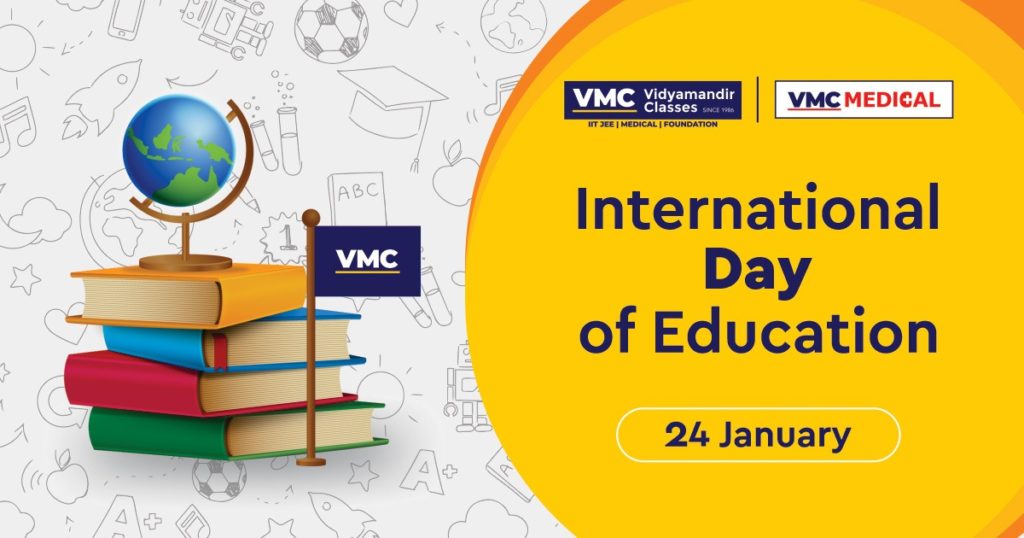INTERNATIONAL EDUCATION DAY
545 total views, 1 views today

Benjamin Franklin said it right that ‘An investment in knowledge pays the best interest.’ If you start focusing on nurturing your intellectual being, you will see wonderful results. This is a type of investment that we don’t even realize we’re making. However, if you add a little consciousness to it, you’ll be able to see its essence.
Imagine living in a universe where we still make fire by rubbing stones together and not knowing the concept of friction. How backward we would be and we would be missing out on so much. Education has enlightened us and made us who we are today. It has instilled in us morals, values, science, history and so much more. One of the most powerful components of life is education. We can make sense of the world around us, the world inside of us, and where we fit into it through education and learning. For all of us, a proper and good education is critical. It promotes quality learning throughout one’s life for individuals of all ages, castes, creeds, religions, and regions. It refers to the process of acquiring information, values, skills, beliefs, and moral habits. People need to be more conscious of the value of information than they were previously. Education is essential for everyone to improve their knowledge, way of life, as well as their social and economic standing throughout their lives. Everyone’s right to a proper education is protected by the law, and restricting it is a crime. Education is the most effective means of overcoming all personal and social issues. We all value education since it plays such an essential role in our lives. We must be educated in order to live a better and more tranquil life. It entirely changes us from the inside out, altering our thinking and personality while also increasing our self-confidence. Because it is constructive in nature, it profoundly transforms our lives.
International Education Day is a day dedicated to education that occurs every year on January 24th as part of the International Celebration Day. The United Nations General Assembly established January 24 as International Education Day on December 3, 2018, in honor of the role of education in achieving world peace and sustainable development. Meanwhile, on November 11, India commemorates the birth anniversary of India’s first Education Minister, Maulana Abul Kalam Azad, with a National Education Day. Azad was a major supporter of women’s education.
The information era, often known as the technical or digital age, is a period in which information is readily available. We can at the very least make the most of it. We know that searching for what we need right now is simple thanks to a great instrument called the internet. It only takes one click to find a nearby library, a current event, technical progress, socialize to learn, and so on. Because of its portability and cross-platform compatibility, it’s an excellent approach to begin intentionally investing in knowledge. It makes it simple to learn new things. To transform the future, we must urgently rebalance our connections with one another, with nature, and with technology, which pervades our lives and offers unprecedented potential while also raising severe issues about equity, inclusion, and democratic involvement.
This year’s International Day of Education will serve as a showcase for the most essential changes that must be nourished in order to realize everyone’s fundamental right to education and build more sustainable, inclusive, and peaceful futures. It will spark discussion about how to improve education as a public good, how-to guide the digital transformation, support teachers, protect the environment, and unleash the potential of every individual to contribute to collective well-being and our common home.
Education is a tool that can be used to promote growth and advancement, but access to it is extremely unequal. This difference was exacerbated by the Covid-19 pandemic. Due to the shutdown of schools, universities, and other educational institutions during the pandemic, education suffered a significant gap, necessitating a move to an online mode.
How science and medicine have contributed to the education sector
In classrooms, new technologies can assist pupils in understanding science and bringing ideas that were previously confined to the pages of books to life. Technology, without a doubt, makes learning more participatory, and thus more intriguing and remembered.
Children and teenagers can be creative while simultaneously learning new skills and understanding how things function in technology and design classes. Students can gain a plethora of information and expertise from technology education, which they might apply in the future to pursue a related career or simply as a subject of interest and intrigue. Because technology is becoming an increasingly important aspect of the culture in which children are growing up, it is only logical that they should learn about the appliances and systems they use every day. Technology, like science, encourages kids to think about and ask questions about what they see and learn, which leads to a desire to learn more and pass on what they’ve learned to others.
The significance of medical schools and graduate medical education programs (residences) in connection to medical developments in the twentieth century; diagnosis, prognosis, and therapy were revolutionized. This historical essay examines the growth of the educational system and the successful fight to establish a standardized, science-based curriculum and bedside education. As a result, successive generations of well-educated physicians with a broad understanding of science, a grasp of laboratory methodologies, and the competence to practice medicine at the bedside have emerged. These developments in medical education laid the groundwork for medical progress.
Well, Einstein said it right that ‘Education is what remains after one has forgotten what one has learned in school.’
